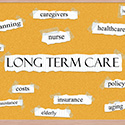
 In last month's post, we talked about Assisted Living as a housing option for older adults. But do you know about CCRCs or Continuing Care Retirement Communities? CCRCs are an option for those older adults who have the financial means to support this type of housing.
In last month's post, we talked about Assisted Living as a housing option for older adults. But do you know about CCRCs or Continuing Care Retirement Communities? CCRCs are an option for those older adults who have the financial means to support this type of housing.
What is a CCRC?
In general terms, a CCRC is the most comprehensive of all housing options that can satisfy the needs/wants of those older adults who are healthy and active, as well as those who need assistance and those who need skilled nursing care. The structure of these communities provides individual residences (usually in the form of an apartment or condo) for independent living, but provide options within the community for assisted living or nursing care. Once you move to the CCRC, you never have to move again! CCRCs are not for the financially faint of heart – they generally require a buy-in/entrance fee and a monthly service fee. However, most communities guarantee that once your are approved and have moved in, you will never have to leave, regardless of your future financial position,.
How, might you ask, do CCRCs look when we view them in the context of our 4 “C’s”(Comfort, Convenience, Companionship and Care)?
Peace of Mind and Comfort Knowing You Never Need to Move
As an older adult, making the decision to move from your home is a big one – one that you likely don’t want to make more than once. Moving to a CCRC allows you to make that decision only once. No matter what needs you have as you age, they will be provided for in the CCRC. You should make sure that you are aware of how possible transitions will work within the specific communities that you look at and the financial impact of each. Especially for married couples, there may be significant additional financial costs if one needs assisted or nursing care and the other remains independent.
Convenience of…everything!
CCRCs provide most conveniences of everyday living:
- Transportation if you can’t or don’t want to drive on your own.
- Activities – usually a full gym, clubs, social activities, classes and entertainment on community grounds, as well as organized trips off campus.
- Restaurants, banks and visits from dentist, eye doctors, etc. are generally available on campus.
- Services of all kinds are usually available (maintenance and cleaning for your residence; food plans so you don’t have to cook, etc.)
Companionship of All Kinds
In working with clients who live in CCRCs, I have found that they can always be around people and be busy…if they want to be. The options available to interact with others that have similar interests are many…usually more than you have time for. I have found that moving to these communities, for many, has resulted in an improvement in quality of life.
Care at Every Level
Ideally, you consider moving to a CCRC when you are completely independent and have no need for assistance, so that you can engage in all that these communities have to offer. However, if and when assistance is needed, you can be certain that it will be available. Assistance can be provided within the independent living units or within the community at a different location – every level of care can be provided for without another move being required.
If you or someone you know thinks they may need to look at the possibility of moving to a CCRC, I recommend (as always) to plan ahead AND to consult your financial planner to make sure that your finances are sufficient. Please contact me if you need additional resources or have additional questions about this or other housing options.
Sandra Adams, CFP® is a Partner and Financial Planner at Center for Financial Planning, Inc. Sandy specializes in Elder Care Financial Planning and is a frequent speaker on related topics. In 2012-2014 Sandy has been named to the Five Star Wealth Managers list in Detroit Hour magazine. In addition to her frequent contributions to Money Centered, she is regularly quoted in national media publications such as The Wall Street Journal, Research Magazine and Journal of Financial Planning.
Five Star Award is based on advisor being credentialed as an investment advisory representative (IAR), a FINRA registered representative, a CPA or a licensed attorney, including education and professional designations, actively employed in the industry for five years, favorable regulatory and complaint history review, fulfillment of firm review based on internal firm standards, accepting new clients, one- and five-year client retention rates, non-institutional discretionary and/or non-discretionary client assets administered, number of client households served.
Any opinions are those of Sandra Adams and not necessarily those of Raymond James. C14-028648


















